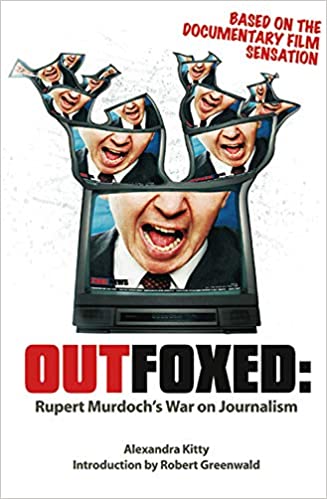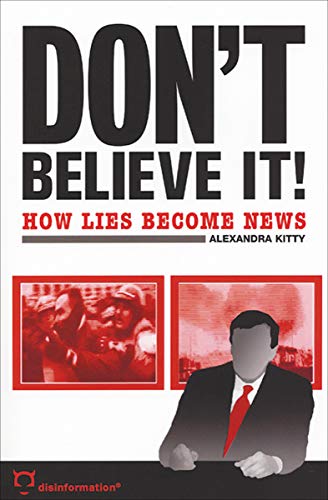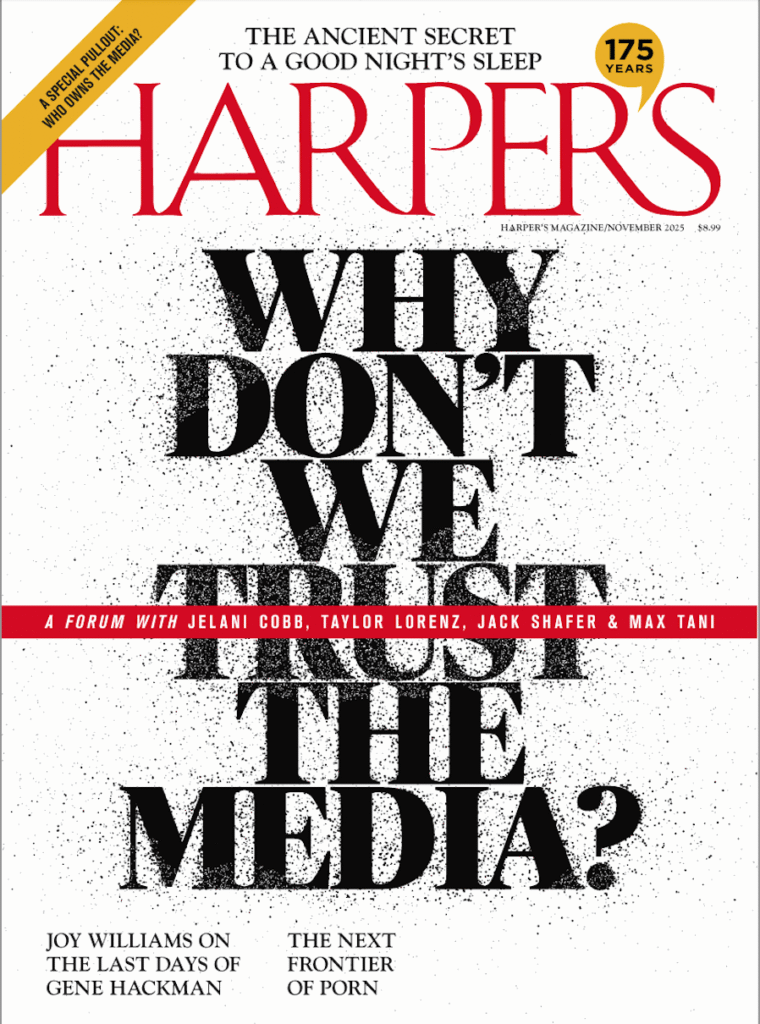Why did journalism collapse? Don’t ask Harper’s.
I haven’t written about the woes of journalism in a couple of years. I wrote articles, a blog, and numerous books from 2005-2023. The last one was called Radial Journalism. I perfected (Empirical) and developed (Therapeutic, Organic, and Radial) four different alternative models of journalism based in core literacy. I am perhaps best known for this book.

Although this one is probably on par with it.

I left that niche because I was tired of being typecast as a journalism critic, and there is more to Alexandra Kitty than journalism.
And, as of 2025, we don’t have journalism. Not on SubStack. Not on legacy media, and certainly not on TikTok. That profession was taken over by partisan and corporate interests, and distorted it until nothing of it remained. I went on with my career, teaching, writing, and now, developing interactive documentaries.
But this laughable self-congratulary article in Harper’s got my attention.

The article is bad. It is typical of the lack of self-awareness the profession always had. Its roundtable merely has four clueless Mary Sues opining without empiricism or facts.
One of the most clueless comments came from Jack Shafer:
Shafer: I think we’re overlooking some important context here, which is that trust was the highest when the media really couldn’t be trusted. Gallup data on media trust goes back only to the early Seventies. Yet we know that in the Sixties, trust in the media was incredibly high.
And we know from history that in the Fifties and the early Sixties, newspapers were not telling the whole story. You would not find stories about race, for instance. Stories about race, sex, class, and inequality were not part of the editorial package. But people trusted those newspapers much more precisely because they gave them an inaccurate view of the world.
This is ignorant. When journalism seemingly went after corporate and political interests in the 1970s (The Pentagon Papers, Watergate), trust increased. Contrary to popular opinion, people want to be informed. To assume that journalism of yore was problematic, but now it’s all fixed up is unfounded. It has gotten much worse over time. It’s partisan, propagandistic, unscientific, simplistic, credulous, and for all the talk of the bad old days, its model is no different than it was decades ago.
When I wrote books, I relied on old newspaper articles because while they weren’t scientific, they were factual. Where did a victim live? What were the specs of a hospital train? How many people were truly displaced after a natural disaster? Today’s articles never pin down specifics, but they did decades ago, and I could verify it easily. These days, you have articles about police looking for a dangerous suspect or a missing person, but then don’t even release a photo or name of the suspect or missing person. That’s bad journalism.
So how did journalism really fall into an abyss? If you want a deep dive, read my books. I spelled this mess out years ago. But, if you want a quick explanation, here it is:
- Appeal to Authority: It doesn’t matter if the authority is on the Left or the Right, blindly deferring to one set of talking points without empirical, data-driven evidence looks like a propaganda-job, because it is. And no, slapping, “According to Experts” at the end of a headline is not a reasonable facsimile for real research.
- PR Firm Stenography: Journalists crib from publicists, PR firms, and their press releases.
- Incessant Fear-Mongering: Good old-fashioned propaganda that screams, “If you don’t do exactly what we demand of you, you’ll all die!” is a great way to alienate audiences. Those COVID-19 Death Trackers made the news ghoulish and unpleasant. Worse, there was never any context (age, co-morbidity, etc.), which was deceptive and manipulative.
- Royal Decrees: Columnists are the worst offenders, telling the little people what to think and how to think about it. None of these scribes have the expertise or direct experience to know what Politician X should or shouldn’t be doing. They are outside observers, and if we are going to have people with paper crowns making decrees, people will put on their own paper crown and do it themselves on X and SubStack.
- Not Understanding Technology: What sped up journalism’s demise was its previous gilded reality. Communication was a one-way street and they worked for the gate-keepers. What they did, rightly or wrongly, was reinforced and rewarded because they were shielded from the public, who always disagreed with the press, but had no means of expressing it in a public forum. The Internet became mainstream, and then blogs were the first chance people had to express their views or realities to others. YouTube broke another barrier, and social media was the game-changer. Journalists never understood that technology altered their place in the world, and instead of altering their models and their business models, they went on as if it was a bygone decade.
- Keeping to the Past: This is related to Point 5: journalism attracts a certain kind of worker and a certain kind of consumer, and they are not attracting new blood. The average television news viewer is 65 years old. The average newspaper reader is 55 years old. You want to stick with the horse and buggy? Fine, but don’t complain about those zipping around in space ships.
- AI-Illiteracy: Journalists fear AI the way they feared social media a generation ago. They are ignorant to the point of illiteracy. AI is a gift to the profession, yet journalists still spew old arguments because they haven’t tested the limits of AI. I have, and it changed how I do everything. Had I this tool sooner, I would have done a lot of things more efficiently. Having AI is like having an elite team working with you.
- Lack of Training in Psychology and Propaganda: People do not always want to publicly admit that they believed a lie, but they know they did, and need an out. Journalists cannot pander or appease partisan groups, and must stay in the radical centre because manipulation comes from above (authority), below (the masses), Left, and Right. To maintain this balance takes a deep understanding in psychology, what parts of the brain get triggered and why, and propaganda, how we are manipulated from a neurobiological level. Governments have nudge units and counter-insurgency manuals, but no one levels this playing field. Partisan factions may proclaim that they do, but they use the same tactics as cults to recruit the broken and disillusioned. Journalists should have always been the ones who pointed out how people are being played by various factions. Instead, they chose to remain ignorant as the picked sides. Had they explained what was really happening, people would have trusted them, even if they were angry at them.
- Hubris: To see the world as it is, it takes curiosity, patience, and humility. You don’t give in to narcissism or paper crowns. It is telling that Harper’s picked four people in the industry to make self-assessments, and not, let’s say, four people whose lives were ruined by unfair media coverage, such as innocent children of newsmakers who were caught in a scandal, or people wrongly accused of murder. Those people can actually tell you why journalism failed, but this wasn’t a think piece: this was a clumsy attempt at trying to sweet talk people into coming back into the fold.
- Disconnection: The business model of journalism works against the actual journalism, but academics, with a few notable exceptions, were never actual journalists or editors, and their ignorance of the profession’s realities shows. The ones with no background in journalism are literally clogging up academic journals with “studies” that have no ecological validity, making them useless.
I could make a larger list than this one: from covering soft news to reliance on focus groups, but these are the nails in journalism’s coffin. You now have partisan shills spewing to their various flocks, all jockeying for a patronage appointment within governments. You don’t have a reporter covering propaganda, for instance, showing how various factions are trying to gain control over people to wear that paper crown. The fact that we don’t have a radical centrist pointing out how various factions are working to control your opinions speaks volumes.
That’s why we don’t have journalism: not on TikTok, SubStack, or legacy and digital media. People talk of “AI slop”, but conveniently leave out the part about human journalism slop. You know more about Taylor Swift than you do about the lobbyists removing your liberties.
And that’s why journalism can’t be trusted.
